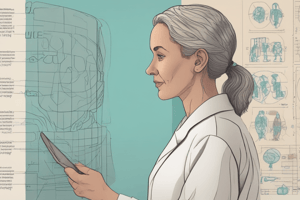Podcast
Questions and Answers
What is evidence-based practice (EBP)?
What is evidence-based practice (EBP)?
Integration of clinical expertise, patient values, and best research evidence into the decision-making process for patient care.
The five steps in evidence-based practice are: Ask, Acquire, Appraise, Apply, and _____
The five steps in evidence-based practice are: Ask, Acquire, Appraise, Apply, and _____
Assess
Which of the following is a foreground question? (Select all that apply)
Which of the following is a foreground question? (Select all that apply)
- How many people are affected by migraine headache?
- What are clinical signs of measles infection?
- What is the etiology of asthma?
- What is the best treatment for diabetes? (correct)
What does Level 1 evidence consist of?
What does Level 1 evidence consist of?
Which level of evidence represents descriptive studies such as case studies?
Which level of evidence represents descriptive studies such as case studies?
Qualitative research relies on numerical data under standardized conditions.
Qualitative research relies on numerical data under standardized conditions.
What are the two main approaches in research?
What are the two main approaches in research?
Flashcards are hidden until you start studying
Study Notes
Evidence-Based Practice (EBP)
- EBP integrates clinical expertise, patient values, and best research evidence for informed patient care decisions.
Five Steps in Evidence-Based Practice
- Ask: Formulate clinical questions using PICO (Population, Intervention, Comparison, Outcome).
- Acquire: Gather relevant literature based on the formulated question, considering the hierarchy of evidence.
- Appraise: Assess the validity, relevance, and significance of the literature reviewed.
- Apply: Synthesize evidence, clinical expertise, and patient preferences to make decisions.
- Assess: Evaluate the outcomes for effectiveness; determine if further evidence or questions are necessary.
Background vs. Foreground Questions
- Background Questions: Request general knowledge about a patient's condition (e.g., prevalence of migraines).
- Foreground Questions: Specifically address individual patient care decisions, often framed using PICO (e.g., effectiveness of a specific treatment).
Levels of Evidence
- Organized by quality and amount of information, indicating study rigor.
- Level 1: Systematic reviews and meta-analysis offer the strongest evidence.
- Level 2: Individual randomized controlled trials (RCTs) or observational studies present strong findings.
- Level 3: Studies with weak bias control, such as nonrandomized studies and retrospective cohorts.
- Level 4: Description-based studies, like case studies and historical controls, provide low evidence.
- Level 5: Mechanistic reasoning, which is theoretical but lacks empirical support.
Categories of Research
- Descriptive: Aims to characterize a group through variables (e.g., case studies, qualitative research).
- Exploratory: Observational studies investigating phenomena (e.g., case-control, cohort studies).
- Explanatory: Compares interventions or conditions (e.g., RCTs, pragmatic trials, quasi-experimental designs).
- Quantitative Research: Focuses on measuring outcomes numerically, standardizing conditions.
- Qualitative Research: Involves descriptive data collection via interviews and observations, emphasizing narrative data.
Studying That Suits You
Use AI to generate personalized quizzes and flashcards to suit your learning preferences.




